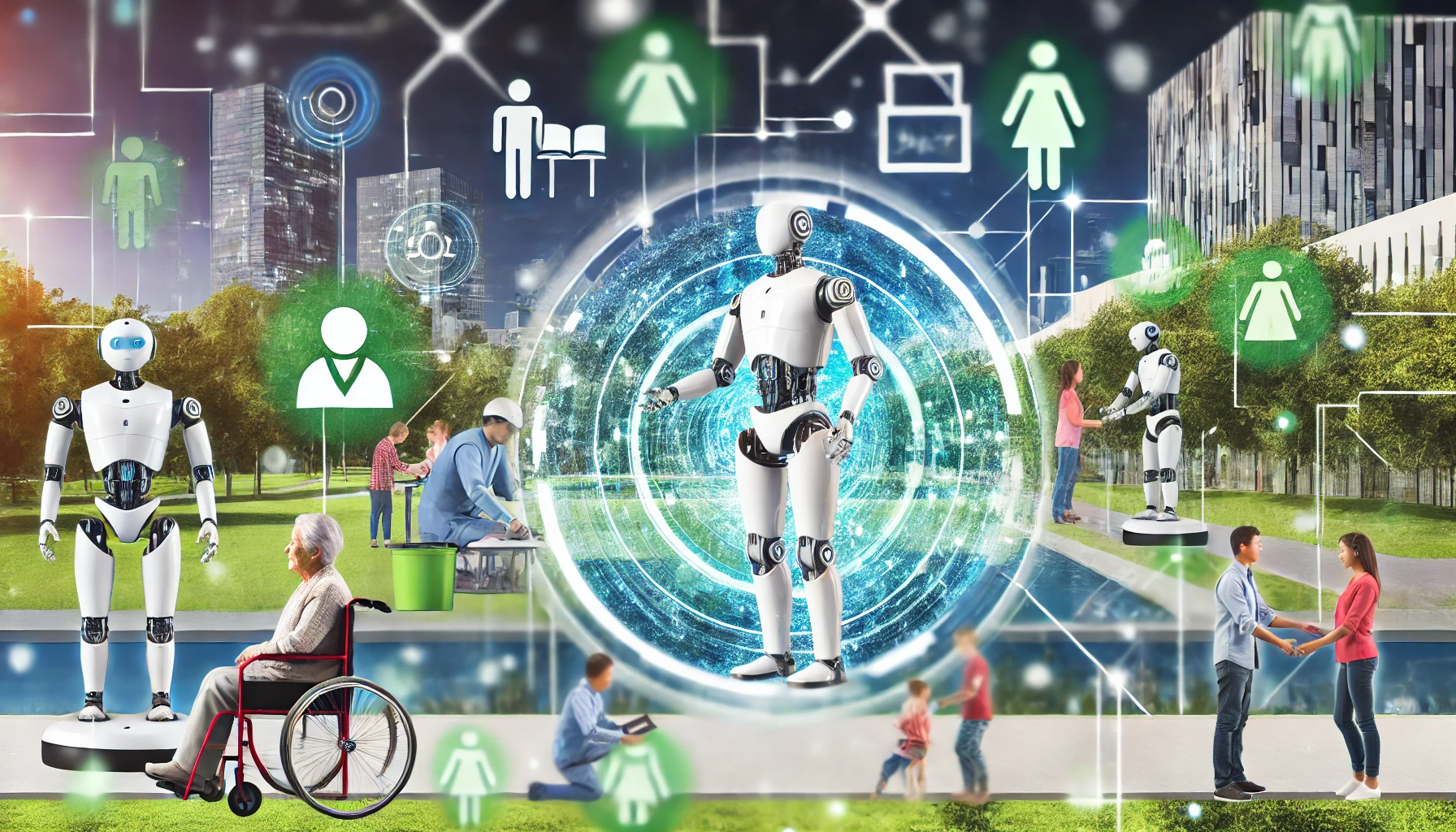
The Transformative Impact of Robots on Human Experience
As we stand on the brink of an era dominated by robots and AI, the question is no longer if these technologies will change our lives, but how profoundly they will do so. From enhancing our capabilities to reshaping our relationships, spirituality, work life, and even our understanding of the universe, robotic technology promises to revolutionize every aspect of human existence. Yet, alongside these advancements come potential harms that challenge our very sense of personhood and societal norms.
These things are not to be feared. As all of life is a game or illusion, we can interact with all of these shifts in ways that truly uplift and illuminate us. Every challenge in our lives is a calling to rise above mediocrity and imagined limits – and embrace our remarkable potential.
You got this. Let’s dive in….
Redefining Personhood
The human body, long seen as the vessel of our identity, is now becoming a canvas for robotic enhancement. Prosthetics and exoskeletons are no longer mere medical aids but are evolving into advanced extensions of our physical selves. These technologies can restore mobility, enhance strength, and provide new senses, dramatically improving the quality of life for those with disabilities and even augmenting the capabilities of the able-bodied. However, as we embrace these enhancements, we must confront complex questions about identity. When our physical capabilities are intertwined with machines, where do we draw the line between human and robot? This blurring of boundaries forces us to re-examine what it means to be human.
The promise of robotic health monitors and AI-driven medical interventions brings hope for a future where diseases are detected early and treated with unprecedented precision. Yet, this reliance on technology for our well-being could lead to a dangerous dependence. As we delegate more responsibility for our health to machines, we risk losing touch with our bodies’ natural signals, potentially leading to a passive approach to personal health that undermines our autonomy.
As we journey through the integration of robots and AI, it is crucial to recognize their potential as catalysts for personal transformation. These technologies offer unprecedented opportunities for growth, not just physically but also mentally and emotionally. Imagine a world where robotic exoskeletons empower those with disabilities to pursue their dreams unencumbered by physical limitations. Picture AI-driven learning platforms that adapt to individual needs, helping people overcome learning challenges and unlock their full intellectual potential.
These tools can serve as mirrors, reflecting our inner strengths and weaknesses, and guiding us towards self-improvement. By leveraging AI for personalized meditation and mindfulness practices, individuals can delve deeper into their consciousness, confronting and healing past traumas, and emerging with a renewed sense of purpose and clarity.
Evolving Relationships
In the realm of human relationships, robots are poised to play dual roles as enhancers and disruptors. Social robots, designed to provide companionship, have the potential to alleviate loneliness, especially among the elderly. These machines can engage in conversation, remember personal details, and even recognize emotional cues, offering a semblance of human interaction that can significantly improve mental health and emotional well-being.
However, the intimacy shared with robots might come at a cost. As we form bonds with machines, the authenticity of human connections may be compromised. Emotional detachment from real people could become a societal norm, as convenience and consistency of robotic companionship overshadow the complexities of human relationships. Additionally, the data collection inherent in these interactions poses significant privacy concerns, potentially eroding trust not just between individuals but between people and the institutions that deploy these technologies.
Spirituality in the Age of Machines
Spiritual practices, often deeply personal and human-centric, are also being transformed by robotic technology. AI-driven meditation aids can guide individuals through mindfulness practices, tailoring sessions to personal needs and progress. This accessibility can democratize spiritual practices, making them more attainable for people with disabilities or those who live in isolation.
Yet, the infusion of technology into spirituality raises poignant questions. The mechanization of meditation and prayer might strip these practices of their mystical essence, reducing profound experiences to algorithmic responses. Furthermore, the presence of robots in sacred spaces could challenge the authenticity and ethical integrity of spiritual practices, leading to a potential disconnection from the very essence of spirituality.
The essence of spirituality lies in the recognition of our interconnectedness, the realization that we are all part of a greater whole. Robots and AI, when used mindfully, can help us deepen this understanding. AI-driven communication tools can facilitate cross-cultural dialogues, fostering empathy and understanding between people from diverse backgrounds. Imagine a world where language barriers are seamlessly overcome, where individuals can connect on a profound level, sharing their stories and experiences without misunderstanding.
Furthermore, AI can play a pivotal role in addressing global challenges such as climate change and poverty. By analyzing vast amounts of data, AI can provide insights that lead to innovative solutions, reminding us of our collective responsibility to care for our planet and each other. This shared endeavor can strengthen our sense of unity, encouraging us to work together towards a harmonious future.
Revolutionizing Work Life
In the workplace, robots and AI are not just tools but collaborators, fundamentally changing how we work. Automation of repetitive tasks in manufacturing, logistics, and retail frees humans to engage in more complex, creative endeavors. This shift could lead to a renaissance of innovation, where human ingenuity is complemented by robotic precision.
However, this transformation also threatens job security for many, particularly those in roles susceptible to automation. The challenge lies in reskilling the workforce to adapt to new realities. For those aged 40-60, this shift may be particularly daunting. Leveraging decades of experience while embracing new technologies requires a delicate balance of humility and courage. Continuous learning, adaptability, and emotional resilience become crucial in navigating this new landscape.
Intimate Relations in a Robotic Era
The intersection of robotics and human intimacy opens another controversial chapter. Sex robots, equipped with AI to simulate emotional and physical intimacy, are becoming increasingly sophisticated. These machines promise to fulfill desires and offer companionship without the complexities of human relationships.
Yet, this technological advance brings with it ethical and psychological dilemmas. The commodification of intimacy may deepen the objectification of relationships, reducing the richness of human connection to transactional interactions. The emotional fulfillment provided by machines could lead to unrealistic expectations of human partners, potentially undermining real relationships and distorting our understanding of love and connection.
A New Sense of Meaning and Understanding
As robots become more integrated into our lives, they also prompt us to reconsider our place in the universe. AI’s ability to process vast amounts of information and provide insights challenges our cognitive boundaries, pushing us to think beyond human limitations. This expanded understanding can deepen our sense of curiosity and drive to explore the cosmos, enhancing our appreciation of the universe’s complexity.
However, the rise of AI also brings existential questions to the forefront. As machines become capable of tasks traditionally reserved for humans, we must grapple with the implications for our sense of purpose and meaning. If robots can perform our jobs, predict our health outcomes, and even provide companionship, what is left for us? This profound shift necessitates a reevaluation of our roles and the unique contributions we can make beyond what machines can offer.
Conclusion: Embracing the Transformative Journey
As we navigate the transformative journey of integrating robots and AI into our lives, let us do so with an open heart and a clear vision. Embrace these technologies not as mere tools but as partners in our quest for personal and collective growth. Let us strive to use them to enhance our interconnectedness, deepen our ethical reflections, and work towards a harmonious future.
In this era of rapid change, let us hold on to the timeless values of hope, love, and light. By doing so, we can ensure that technology serves humanity in ways that uplift and inspire, creating a world where every individual has the opportunity to thrive and contribute to the greater good. As we stand on the brink of this new frontier, let us move forward with confidence, compassion, and a deep commitment to the well-being of all.
Get The Shankara Oracle and dramatically improve your perspective, relationships, authentic Self, and life.




